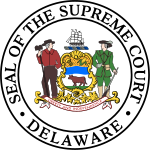|
Smith v. Van Gorkom
Smith v. Van Gorkom 488 A.2d 858 (Del. 1985)[1] is a United States corporate law case of the Delaware Supreme Court, discussing a director's duty of care. It is often called the "Trans Union case". Van Gorkom is sometimes referred to as the most important case regarding business organizations because it shows a unique scenario when the board is found liable even after applying the business judgment rule.[2][3] The decision "stripped corporate directors and officers of the protective cloak formerly provided by the business judgment rule, rendering them liable for the tort of gross negligence for the violation of their duties under the rule."[4] FactsThe case involved a proposed leveraged buy-out merger of TransUnion by Marmon Group which was controlled by Jay Pritzker.[5] Defendant Jerome W. Van Gorkom, who was TransUnion's chairman and CEO, chose a proposed price of $55 without consultation with outside financial experts. He only consulted with the company's CFO, and that consultation was to determine a per share price that would work for a leveraged buyout.[5] Van Gorkom and the CFO did not determine an actual total value of the company.[5] The board approved the sale of TransUnion because it suffered accelerated depreciation and a reduced income; in other words, it had more tax credits than income. The court was highly critical of this decision, writing that "the record is devoid of any competent evidence that $55 represented the per share intrinsic value of the Company." The proposed merger was subject to Board approval. At the Board meeting, a number of items were not disclosed, including the problematic methodology that Van Gorkom used to arrive at the proposed price. Also, previous objections by management were not discussed. The Board approved the proposal. JudgmentMajorityThe Court found that the directors were grossly negligent, because they quickly approved the merger without substantial inquiry or any expert advice. For this reason, the board of directors breached the duty of care that it owed to the corporation's shareholders. As such, the protection of the business judgment rule was unavailable. The Court stated,
488 A.2d at 872. Furthermore, the court rejected defendant's argument that the substantial premium paid over the market price indicated that it was a good deal. In so doing, the court noted the irony that the board stated that the decision to accept the offer was based on their expertise, while at the same time asserting that it was proper because the price offered was a large premium above market value. The decision also clarified the directors' duty of disclosure, stating that corporate directors must disclose all facts germane to a transaction that is subject to a shareholder vote. DissentJustices McNeilly and Christie wrote dissenting opinions. McNeilly hotly dissented, calling the majority's opinion a "comedy of errors," and saying it "reads like an advocate's closing address to a hostile jury. And I say that not lightly." Particularly, McNeilly argues the facts show the board made an informed decision:
Christie also argues the business judgment rule protects the board in this case. SignificanceThe case prompted an outcry from boards of directors of public companies, a sharp increase in insurance premiums for directors and officers' insurance, and the eventual adoption by the Delaware legislature of Delaware General Corporation Law §102(b)(7) as extracted below. This permits Delaware companies (with shareholder approval) to adopt charter amendments that exculpate directors from personal liability for breaches of the duty of care.
The vast majority of Delaware corporations now have a 102(b)(7) provision in their certificate of incorporation.[6] Nevertheless, the case lives on as a reminder that directors should take reasonable actions to inform themselves before acting. After the court's decision to remand the case back to the Court of Chancery the defendants agreed to a settlement.[5] The directors agreed to pay $23.5 million in damages, of which $10 million was covered by insurance with Pritzker then paying the remainder of the settlement even though he was not a party to the lawsuit.[5] Pritzker paid as he did not agree with the court and some of the defendants were unable to pay the settlement.[5] Ultimately, the main significance of the Trans Union case is that fairness opinions, typically provided by investment banks, are effectively now a legal requirement of any public company merger.[7] CriticismDaniel Fischel, a leading scholar in the regulation of corporations, described the Smith v. Van Gorkom opinion as "one of the worst decisions in the history of corporate law."[8] This criticism stems in part from the fact that the court made independent directors potentially liable for millions of dollars in damages for selling a company for approximately a 60% premium to its market value. Such liability provides a strong disincentive for the best potential directors to serve on the board, and one would expect such a disincentive to result in worse corporate governance. The decision has also been derided as the "Investment Banker's Relief Act of 1985" because of all the business it has generated for investment bankers from boards seeking to avoid liability or other legal entanglements. See alsoNotes
References
External linksWikisource has original text related to this article:
|
||||||||||||||||||||||||
